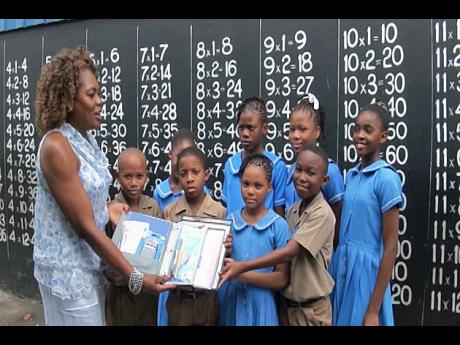Math, no problem! - Parents being tapped to help children improve performance
A veteran mathematics teacher believes she has found the solution to Jamaican children's problem in the subject.
With fewer than half of the children (47.7 per cent) who sat the math exam in this year's Caribbean Secondary Education Certificate (CSEC) achieving a passing grade, Stephanie Corcho-Fraser is confident that her formula could stop reverse the 6.2 percentage point decline in the number of passes recorded this year and move the pass rate even higher.
Corcho-Fraser, who has more than 30 years' experience teaching math, believes the root of the problem is the non-involvement of parents in their children's academic life, especially in the subject area of mathematics.
"From my experience, because I have been privileged to be able to teach, children perform much better in math when their parents are involved," said Corcho-Fraser.
"I started out teaching at a high school, went on to teach at the master's level and then went back down to the primary school level, so I have done the whole gamut.
"So I pretty much have an understanding of the problems that we have at the top and how we can fix it from the bottom, and with that I really believe parents' involvement is key," added Corcho-Fraser.
Supporting evidence
Her view is supported by evidence from a study conducted by the Grades 4-6 GSAT Centre among 480 grade-six students between 2007 and 2011.
During the four-year period of the study, the parents of 124 of the 480 students regularly attended Sunday sessions in math and communication task to familiarise themselves with the subjects, so as to better help their children as well as they sat in the regular classes with students.
All 124 students earned a place in their first to third choices schools while all eight government scholars who attended the centre over the four-year period were students whose parents were actively involved in the exam preparation.
It is based on this evidence and other studies conducted abroad that Corcho-Fraser, who founded the GSAT Centre and is co-founder of Campion College Saturday School - later renamed Math and More Centre for Excellence - is embarking on another project locally.
"I taught for 20 years at Campion College and during those years the students who had parental help were the ones who did best, and so it told me that there needs to be more emphasis given to the parental aspect of the whole system," Corcho-Fraser told The Sunday Gleaner.
"And so what I will be doing is hosting monthly workshops for parents of children at primary schools. We can only host 100 in this first pilot based on the limited funds at my disposal."
Corcho-Fraser, who currently resides overseas where she lectures in mathematics part-time at a high school and a college, will visit the island to conduct the workshops starting October 2 with 100 selected parents of grade-six children.
Clan Carthy Primary and St Jude's Primary have been given 20 places each while Unity Primary has been granted 10, with Corcho-Fraser and her team to identify another 50 parents.
"Ideally, we wanted to take it from grade four as we found that 90 per cent of our students, their favourite subject is mathematics up to grade three, and in grade four it is no longer, and that's when the parental help dwindles," said Corcho-Fraser.
"But because of this pilot we want to see the end result, we want to see how effective this can be, so we are targeting the grade-six parents only for this run.
"We have a curriculum outlined that I have actually put forward to two schools already, that is Clan Carthy and St Jude's, so I have meet with those teachers and asked what are the areas that you think you want the parents to be involved in."
Free workshop
The workshops, which will be free, will see Corcho-Fraser working with the parents while she is in the island at the end of each month. During the month the parents will go online for activities related to what they have been taught using two programmes called Edmodo and Schoology, while she will also be doing YouTube presentations.
"I will be breaking it down to their level that they can understand. There are many approaches that are simplified that we can teach to students and to parents; bring it to their own experience and draw the analogies and they will get it," said Corcho-Fraser.
She argued that the concepts that are taught in mathematics at sixth form should be the same concepts taught in a simpler form at primary school, so that there will be continuity instead of a clear distinction.
"There is a complete linkage between the concepts, and we need our teachers, especially at the primary level, to identify those linkages and teach them and use them so that when the children go on to high school they can make that connection, and our results can only be better," Corcho-Fraser said.

